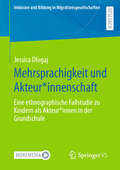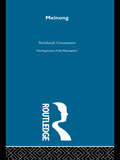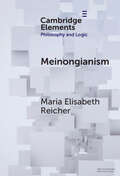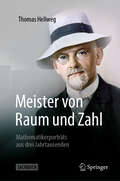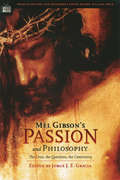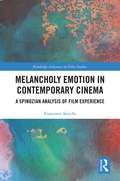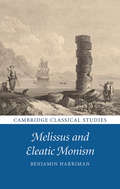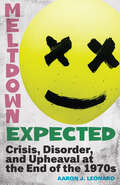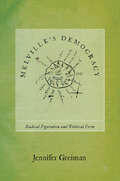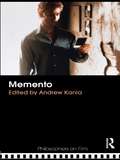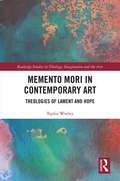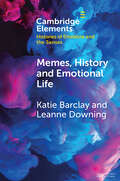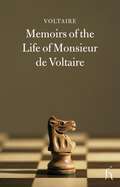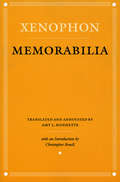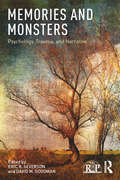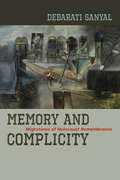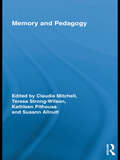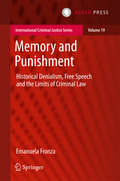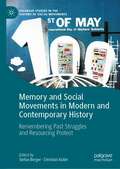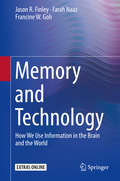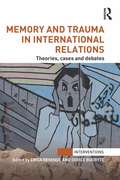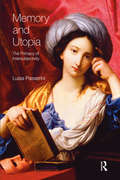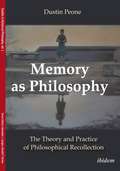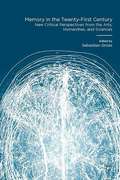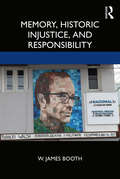- Table View
- List View
Mehrsprachigkeit und Akteur*innenschaft: Eine ethnographische Fallstudie zu Kindern als Akteur*innen in der Grundschule (Inklusion und Bildung in Migrationsgesellschaften)
by Jessica DlugajAusgehend von dem Befund, dass migrationsbedingte Mehrsprachigkeit zwar ein zentrales Thema der Erziehungswissenschaft darstellt, aber gleichzeitig wenig über die konkrete sprachliche Praxis mehrsprachiger Kinder in der Schule bekannt ist, widmet sich diese Fallstudie den sprachlichen Praktiken und Aushandlungen von Kindern an einer Grundschule. Dabei wird auf Basis einer ethnographischen Herangehensweise und unter Hinzunahme eines praxistheoretischen Agency-Konzeptes gezeigt, unter welchen Bedingungen es zur sprachlichen Handlungsfähigkeit von Kindern kommt und wie differenziert sich die mehrsprachige Situation von Kindern im Kontext von Migration im Feld Schule gestaltet.
Meinong-Arg Philosophers (Arguments Of The Philosophers Ser.)
by Reinhardt GrossmannFirst Published in 1999. Routledge is an imprint of Taylor & Francis, an informa company.
Meinongianism (Elements in Philosophy and Logic)
by Maria Elisabeth ReicherMeinongianism (named after Alexius Meinong) is, roughly, the view that there are not only existent but also nonexistent objects. In this book, Meinong's so-called object theory as well as “neo-Meinongian” reconstructions are presented and discussed, especially with respect to logical issues, both from a historical and a systematic perspective. Among others, the following topics are addressed: basic principles and motivations for Meinongianism; the distinction between “there is” (“ x”) and “exists” (“E!”); interpretations and kinds of quantification; Meinongianism, the principle of excluded middle and the principle of non-contradiction; the nuclear-extranuclear distinction and modes of predication; varieties of neo-Meinongianism and Meinongian logics.
Meister von Raum und Zahl: Mathematikerporträts aus drei Jahrtausenden
by Thomas Hellweg2500 Jahre Ringen um einen scheinbar so einfachen Begriff wie den der Zahl. Eine ebenso lange Beschäftigung mit den Fragen des Raumes, der Messung von Entfernungen und Winkeln, der Geometrie und Astronomie. Schon früh kommt die Erkenntnis, dass sich die räumlichen Verhältnisse mit Zahlen beschreiben lassen und dass hierfür zusätzlich zu den Zählzahlen weitere Zahlen benötigt werden. So wachsen die Konzepte von Raum und Zahl zusammen und unternehmen gemeinsam kaum geahnte Höhenflüge. Die Fragen von Raum und Zahl haben seit dem Altertum begabte Menschen angezogen und beschäftigt, die in einer einmaligen Kontinuität an ihnen gearbeitet haben – die Meister von Raum und Zahl, oder die Mathematiker. Ihre Rolle in der Entwicklung unserer Kultur wird in der Öffentlichkeit kaum wahrgenommen. Dabei gibt es kaum eine faszinierendere Entwicklung in der menschlichen Geistesgeschichte als die der Mathematik.
Mel Gibson's Passion and Philosophy
by William Irwin Jorge J. GraciaMel Gibson's The Passion of the Christ has become one of the most controversial films ever made, and it is already a blockbuster of cinematography. Its defenders passionately regard it as one of the most moving and influential pieces of religious art ever created. But its detractors argue with comparable vehemence that the violence and gore it contains, its alleged anti-Semitism, a particular take on the Christian message, and the lack of historical and Biblical accuracy, make it nothing more than a kind of political propaganda. Father Thomas Rosica hailed as one of the great masterpieces of religious art, but the secular humanist Paul Kurtz thinks of it as a political weapon in the hands of the religious right. Film critics are divided in their judgment, giving the film anywhere from no stars to five stars. Regardless of what one thinks of the film, however, its impact both personal and social is beyond question.
Melancholy Emotion in Contemporary Cinema: A Spinozian Analysis of Film Experience (Routledge Advances in Film Studies)
by Francesco SticchiThis work outlines a new methodology for film analysis based on the radical materialist thought of Baruch Spinoza, re-evaluating contemporary cognitive media theory and philosophical theories on the emotional and intellectual aspects of film experience. Sticchi’s exploration of Spinozian philosophy creates an experiential constructive model to blend the affective and intellectual aspects of cognition, and to combine it with different philosophical interpretations of film theory. Spinoza’s embodied philosophy rejected logical and ethical dualisms, and established a perfect parallelism between sensation and reason and provides the opportunity to address negative emotions and sad passions without referring exclusively to traditional notions such as catharsis or sublimation, and to put forth a practical/embodied notion of Film-Philosophy. This new analytical approach is tested on four case studies, films that challenge the viewer’s emotional engagement since they display situations of cosmic failure and depict controversial and damaged characters: A Serious Man (2009); Melancholia (2011); The Act of Killing (2012) and Only Lovers Left Alive (2013). This book is an important addition to the literature in Film Studies, particularly in Cognitive Film Theory and Philosophy of Film. Its affective and semantic analyses of film experience (studies of embodied conceptualisation), connecting Spinoza’s thought to the analysis of audiovisual media, will also be of interest to Philosophy scholars and in academic courses of film theory, film-philosophy and cognitive film studies.
Melissus and Eleatic Monism (Cambridge Classical Studies)
by Benjamin HarrimanIn the fifth century BCE, Melissus of Samos developed wildly counterintuitive claims against plurality, change, and the reliability of the senses. This book provides a reconstruction of the preserved textual evidence for his philosophy, along with an interpretation of the form and content of each of his arguments. A close examination of his thought reveals an extraordinary clarity and unity in his method and gives us a unique perspective on how philosophy developed in the fifth century, and how Melissus came to be the most prominent representative of what we now call Eleaticism, the monistic philosophy inaugurated by Parmenides. The rich intellectual climate of Ionian enquiry in which Melissus worked is explored and brought to bear on central questions of the interpretation of his fragments. This volume will appeal to students and scholars of early Greek philosophy, and also those working on historical and medical texts.
Meltdown Expected: Crisis, Disorder, and Upheaval at the end of the 1970s
by Aaron J. LeonardIn January 1978, President Jimmy Carter proclaimed that “There is all across our land a growing sense of peace and a sense of common purpose.” Yet in the ensuing months, a series of crises disturbed that fragile sense of peace, ultimately setting the stage for Reagan’s decisive victory in 1980 and ushering in the final phase of the Cold War. Meltdown Expected tells the story of the power shifts from late 1978 through 1979 whose repercussions are still being felt. Iran’s revolution led to a hostage crisis while neighbouring Afghanistan became the site of a proxy war between the USSR and the US, who supplied aid to Islamic mujahideen fighters that would later form the Taliban. Meanwhile, as tragedies like the Jonestown mass suicide and the assassination of Harvey Milk captured the nation’s attention, the government quietly reasserted and expanded the FBI’s intelligence powers. Drawing from recently declassified government documents and covering everything from Three Mile Island to the rise of punk rock, Aaron J. Leonard paints a vivid portrait of a tumultuous yet pivotal time in American history.
Melville's Democracy: Radical Figuration and Political Form
by Jennifer GreimanFor Herman Melville, the instability of democracy held tremendous creative potential. Examining the centrality of political thought to Melville's oeuvre, Jennifer Greiman argues that Melville's densely figurative aesthetics give form to a radical reimagining of democratic foundations, relations, and ways of being—modeling how we can think democracy in political theory today. Across Melville's five decades of writing, from his early Pacific novels to his late poetry, Greiman identifies a literary formalism that is radically political and carries the project of democratic theory in new directions. Recovering Melville's readings in political philosophy and aesthetics, Greiman shows how he engaged with key problems in political theory—the paradox of foundations, the vicious circles of sovereign power, the fragility of the people—to produce a body of radical democratic art and thought. Scenes of green and growing life, circular structures, and images of a groundless world emerge as forms for understanding democracy as a collective project in flux. In Melville's experimental aesthetics, Greiman finds a significant precursor to the tradition of radical democratic theory in the US and France that emphasizes transience and creativity over the foundations and forms prized by liberalism. Such politics, she argues, are necessarily aesthetic: attuned to material and sensible distinctions, open to new forces of creativity.
Memento (Philosophers on Film)
by Andrew KaniaWithin a short space of time, the film Memento has already been hailed as a modern classic. Memorably narrated in reverse, from the perspective of Leonard Shelby, the film’s central character, it follows Leonard’s chaotic and visceral quest to discover the identity of his wife’s killer and avenge her murder, despite his inability to form new long-term memories. This is the first book to explore and address the myriad philosophical questions raised by the film, concerning personal identity, free will, memory, knowledge, and action. It also explores problems in aesthetics raised by the film through its narrative structure, ontology, and genre. Beginning with a helpful introduction that places the film in context and maps out its complex structure, specially commissioned chapters examine the following topics: memory, emotion, and self-consciousness agency, free will, and responsibility personal identity narrative and popular cinema the film genre of neo-noir Memento and multimedia Including annotated further reading at the end of each chapter, Memento is essential reading for students interested in philosophy and film studies.
Memento Mori in Contemporary Art: Theologies of Lament and Hope (Routledge Studies in Theology, Imagination and the Arts)
by Taylor WorleyThis book explores how four contemporary artists—Francis Bacon, Joseph Beuys, Robert Gober, and Damien Hirst—pursue the question of death through their fraught appropriations of Christian imagery. Each artist is shown to not only pose provocative theological questions, but also to question the abilities of theological speech to adequately address current attitudes to death. When set within a broader theological context around the thought of death, Bacon’s works invite fresh readings of the New Testament’s narration of the betrayal of Christ, and Beuys’ works can be appreciated for the ways they evoke Resurrection to envision possible futures for Germany in the aftermath of war. Gober’s immaculate sculptures and installations serve to create alternative religious environments, and these places are both evocative of his Roman Catholic upbringing and virtually haunted by the ghosts of his excommunication from that past. Lastly and perhaps most problematically, Hirst has built his brand as an artist from making jokes about death. By opening fresh arenas of dialogue and meaning-making in our society and culture today, the rich humanity of these artworks promises both renewed depths of meaning regarding our exit from this world as well as how we might live well within it for the time that we have. As such, it will be a vital resource for all scholars in Theology, the Visual Arts, Material Religion and Religious Studies.
Memes, History and Emotional Life (Elements in Histories of Emotions and the Senses)
by Katie Barclay Leanne DowningInternet memes are recognised for their role in creating community through shared humour or in-group cultural knowledge. One category of meme uses historical art pieces, coupled with short texts or dialogue, as a form of social commentary on both past and present. These memes often rely on a (mis)reading of the emotions of those represented in such artwork for humorous purposes. As such, they provide an important example of transhistorical engagement between contemporary society and past artifacts centred on the nature of emotion. This Element explores the historical art meme as a key cultural form that offers insight into contemporary online emotional cultures and the ways that historical emotions enable and inform the practices of such culture. It particularly attends to humour as a mode which helps to mediate the disjuncture between past and present emotion and which enables historical emotion to 'do' political and community-building work amongst meme users.
Memoirs of the Life of Monsieur de Voltaire (Hesperus Classics)
by VoltaireWritten in the tongue-in-cheek manner for which he was famous, Monsieur de Voltaire' s memoirs reveal a new perspective on the international politics and history of the 18th century. Voltaire's role as acclaimed author, poet, dramatist, and philosopher led him to experience the personal attentions of the most illustrious men and women of his time. His irreverent, to say the least, portrayals of the leading figures of the day provide a hilarious portrait of the royal courts of Europe which fought over his services for almost 30 years. Only published posthumously, these memoirs relate and then commentate on literary accomplishments, historic fact, and salacious gossip alike.
Memorabilia
by Xenophon Amy L. Bonnette Christopher J. BruellAn essential text for understanding Socrates, Xenophon's Memorabilia is the compelling tribute of an affectionate student to his teacher, providing a rare firsthand account of Socrates' life and philosophy. The Memorabilia is invaluable both as a work of philosophy in its own right and as a complement to the study of Plato's dialogues. The longest of Xenophon's four Socratic works, it is particularly revealing about the differences between Socrates and his philosophical predecessors.Far more obviously than Plato in the dialogues, Xenophon calls attention in the Memorabilia to his own relationship with Socrates. A colorful and fully engaged writer, Xenophon aims above all to convince his readers of the greatness of Socrates' thought and the disgracefulness of his conviction on a capital charge. In thirty-nine chapters, Xenophon presents Socrates as an ordinary person and as a great benefactor to those associated with him.
Memories and Monsters: Psychology, Trauma, and Narrative (Relational Perspectives Book Series)
by Eric R. Severson David M. GoodmanMemories and Monsters explores the nature of the monstrous or uncanny, and the way psychological trauma relates to memory and narration. This interdisciplinary book works on the borderland between psychology and philosophy, drawing from scholars in both fields who have helped mould the bourgeoning field of relational psychoanalysis and phenomenological and existential psychology. The editors have sought out contributions to this field that speak to the pressing question: how are we to attend to and contend with our monsters? The authors in this volume examine the ways in which we might best relate to our monsters, and how the legacies of ancient traumas and anxieties continue to affect our current stories, memories and everyday practices. Covering such manifestations of the monstrous as racism, crimes against humanity, trauma as portrayed in music and art, and the Holocaust, this book explores the impact the uncanny has on our individual and collective psyches. By focusing on a very specific theme, and one that excites the imagination, Memories and Monsters stokes the flames of an important current movement in relational psychoanalysis. It will appeal to psychoanalysts and psychoanalytic psychotherapists, as well as professionals in psychology and graduate school students and tutors in the fields of both psychology and philosophy.
Memory and Complicity: Migrations of Holocaust Remembrance
by Debarati SanyalSince World War II, French and Francophone literature and film have repeatedly sought not to singularize the Holocaust as the paradigm of historical trauma but rather to connect its memory with other memories of violence, namely that of colonialism. These works produced what Debarati Sanyal calls a “memory-in-complicity” attuned to the gray zones that implicate different regimes of violence across history as well as those of different subject positions such as victim, perpetrator, witness, and reader/spectator. Examining a range of works from Albert Camus, Primo Levi, Alain Resnais, and Jean-Paul Sartre to Jonathan Littell, Assia Djebar, Giorgio Agamben, and Boualem Sansal, Memory and Complicity develops an inquiry into the political force and ethical dangers of such implications, contrasting them with contemporary models for thinking about trauma and violence and offering an extended meditation on the role of aesthetic form, especially allegory, within acts of transhistorical remembrance. What are the political benefits and ethical risks of invoking the memory of one history in order to address another? What is the role of complicity in making these connections? How does complicity, rather than affect based discourses of trauma, shame and melancholy, open a critical engagement with the violence of history? What is it about literature and film that have made them such powerful vehicles for this kind of connective memory work? As it offers new readings of some of the most celebrated and controversial novelists, filmmakers, and playwrights from the French-speaking world, Memory and Complicity addresses these questions in order to reframe the way we think about historical memory and its political uses today.
Memory and Pedagogy (Routledge Research in Education)
by Claudia MitchellMemory work – the conscious remembering and study of individual and shared memories – is increasingly being acknowledged as a key pedagogical tool in working with children. Giving students opportunities and support to remember and study their selves as individuals and as communities allows them to see their future as something that belongs to them, and that they can influence in some way for the better. This edited volume brings together essays from scholars who are studying the interconnections between pedagogy and memory in the context of social themes and social inquiry within educational research. The book provides a range of perspectives on the social and pedagogical relevance of memory studies to the educational arena in relation to the themes of memory and method, revisiting childhood, memory and place, addressing political conflict, sexuality and embodiment, and inter-generational studies.
Memory and Punishment: Historical Denialism, Free Speech And The Limits Of Criminal Law (International Criminal Justice Ser. #19)
by Emanuela FronzaThis book examines the criminalisation of denials of genocide and of other mass atrocities in Europe and discusses the implications of protecting institutional historical memory through criminal law.The analysis highlights the tensions with free speech, investigating the relationship between criminal law and historical memory. The book paves the way for a broader discussion about fake news, ‘post-truth’ scenarios, and free expression in a digital world. The author underscores the need to protect well-founded factual records from the dangers of misinformation. Historical denialism and the related jurisprudence represent a key step in exploring this complex field.The book combines an interdisciplinary approach with criminal law methodology. It is primarily aimed at academics, practitioners and others who wish to deepen their understanding of historical denialism, remembrance laws, ‘speech crimes’ and freedom of expression.Emanuela Fronza is Senior Research Fellow in Criminal Law and Lecturer in International and European Criminal Law at the School of Law, University of Bologna. She is a Principal Investigator within the EU research consortium Memory Laws in European and Comparative Perspectives funded by HERA (Humanities in the European Research Area).
Memory and Social Movements in Modern and Contemporary History: Remembering Past Struggles and Resourcing Protest (Palgrave Studies in the History of Social Movements)
by Stefan Berger Christian KollerReflecting the growing interest of historians in memory studies, this edited collection examines the relationship between memory and global social movements from 1848 to the present. For a long time, there has been little attempt by historians to consider memory and social activism in an integrated, systematic, and comparative way. However, in recent years, scholars have demonstrated that social movements rely on collective memories to assert claims, mobilize supporters, and legitimize their political visions, while also helping to further shape collective memories. This book delves into the synergies between memory studies and social movements, exploring how social movements have been constructing and creating memories of their own activity, how specific landscapes of memory have influenced social movements, and how activists have used memory as a cultural resource to further their own goals and ambitions. The case studies presented cover a range of different types of political activism, including the fights for workers’, gay, feminist, and pacifist rights, as well as ecological, urban, and far-right movements across the globe, portraying the diverse interrelations that exist between social movements and collective memory.
Memory and Technology: How We Use Information in the Brain and the World
by Jason R. Finley Farah Naaz Francine W. GohHow is technology changing the way people remember? This book explores the interplay of memory stored in the brain (internal memory) and outside of the brain (external memory), providing a thorough interdisciplinary review of the current literature, including relevant theoretical frameworks from across a variety of disciplines in the sciences, arts, and humanities. It also presents the findings of a rich and novel empirical data set, based on a comprehensive survey on the shifting interplay of internal and external memory in the 21st century. Results reveal a growing symbiosis between the two forms of memory in our everyday lives.The book presents a new theoretical framework for understanding the interplay of internal and external memory, and their complementary strengths. It concludes with a guide to important dimensions, questions, and methods for future research.Memory and Technology will be of interest to researchers, professors, and students across the disciplines of psychology, philosophy, library and information science, human factors, media and cultural studies, anthropology and archaeology, photography, and cognitive rehabilitation, as well as anyone interested in how technology is affecting human memory._____ "This is a novel book, with interesting and valuable data on an important, meaningful topic, as well as a gathering of multidisciplinary and interdisciplinary ideas...The research is accurately represented and inclusive. As a teaching tool, I can envision graduate seminars in different disciplines drawing on the material as the basis for teaching and discussions." Dr. Linda A. Henkel, Fairfield University "This book documents the achievements of a vibrant scientific project – you feel the enthusiasm of the authors for their research. The organization of the manuscript introduces the reader into a comparatively new field the same way as pioneering authors have approached it." Prof. Dr. Wolfgang Schönpflug, Freie Universität Berlin
Memory and Trauma in International Relations: Theories, Cases and Debates (Interventions)
by Erica Resende Dovile BudryteThis work seeks to provide a comprehensive and accessible survey of the international dimension of trauma and memory and its manifestations in various cultural contexts. Drawing together contributions and case studies from scholars around the globe, the book explores the international political dimension of feeling, suffering, forgetting, remembering and memorializing traumatic events and to investigate how they function as social practices for overcoming trauma and creating social change. Divided into two sections, the book maps out the different theoretical debates and then moves on to examine emerging themes such as ontological security, social change, gender, religion, foreign policy & natural disasters. Throughout the chapters, the editors consider the social, political and ethical implications of forgetting and remembering traumatic events in world politics Showcasing how trauma and memory deepen our understanding of IR, this work will be of great interest to students and scholars of international relations, memory and trauma studies and security studies.
Memory and Utopia: The Primacy of Inter-Subjectivity (Critical Histories Of Subjectivity And Culture Ser.)
by Luisa Passerini'Memory and Utopia' looks at the connection between memory and forgetfulness in Europe during the twentieth century. Drawing on oral history and feminist theory and practice, the book highlights how women struggled to be recognized as full subjects. The themes of utopia and desire in the 1968 movements of students, women and workers are explored. 'Memory and Utopia' examines the sense of belonging to Europe that has emerged in the last twenty years. The book analyses European identity as expressed through identities based on gender, age and culture to explore an inclusive and non-hierarchical subjectivity.
Memory as Philosophy: The Theory and Practice of Philosophical Recollection (Studies in Historical Philosophy #1)
by Dustin PeoneDustin Peone argues that memory is the foundation of philosophical thought. This may seem strange to the contemporary reader, but it is something that philosophers themselves have known since before Socrates. Peone advocates a doctrine of “memory as philosophy” that ties philosophical recollection back to the wisdom of the Muses, daughters of Memory, who sing of “what was, is, and shall be.” Part One draws on the work of philosophers from Cicero to Vico to Bergson to articulate the meaning and significance of memory. Peone understands memory not merely in its psychological sense but as the key to metaphysical and moral thinking. Part Two takes up the philosophical history of memory. Peone gives an overview of its role as both a speculative and technical instrument from ancient Greece through Renaissance Europe. Then with the rise of modernity and the critical philosophy of Descartes, the memory tradition falls into disrepute. Why did this happen? Was it accidental? Is a philosophical system grounded in memory possible after Descartes? In the final chapters, Montaigne and Hegel are analyzed as practitioners of “memory as philosophy” in the modern world.
Memory in the Twenty-First Century: New Critical Perspectives from the Arts, Humanities, and Sciences
by Sebastian GroesThis book maps and analyses the changing state of memory at the start of the twenty-first century in essays written by scientists, scholars and writers. It recontextualises memory by investigating the impact of new conditions such as the digital revolution, climate change and an ageing population on our world.
Memory, Historic Injustice, and Responsibility
by W. James BoothWhat is it to do justice to the absent victims of past injustice, given the distance that separates us from them? Grounded in political theory and guided by the literature on historical justice, W. James Booth restores the dead to their central place at the heart of our understanding of why and how to deal with past injustice. Testimonies and accounts from the race war in the United States, the Holocaust, post-apartheid South Africa, Argentina’s Dirty War and the conflict in Northern Ireland help advance and defend Booth’s claim that caring for the dead is a central part of addressing past injustice. Memory, Historic Injustice, and Responsibility is an insightful and original book on the relationship of past and present in thinking about what it means to do justice. A valuable addition to the currently available literature on historical justice the volume will be of great interest to students and scholars of political science, philosophy, history, and law.
